Wasdale mountain rescuer Penny Kirby celebrates 40 years' service
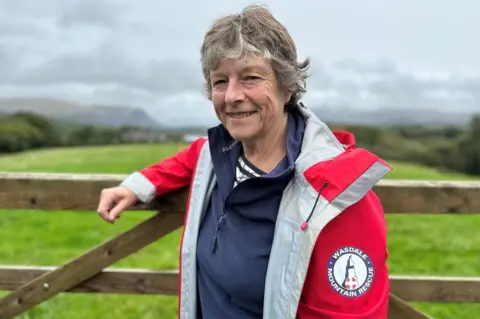 BBC
BBCPenny Kirby and her dogs have spent 40 years saving people in trouble on England's highest mountain. From the Lakes to Lockerbie and the hunt for a mass murderer, she tells the BBC about her life as a rescuer.
Penny isn't sure how many times she has been up Scafell Pike but reckons it must be thousands.
She lives in an old cottage in the foothills beneath the Lake District peak and totally understands the mountain's appeal to walkers and climbers.
"It's a tick box, it's the highest," Penny says, adding: "And on a good day the views are unbeatable."
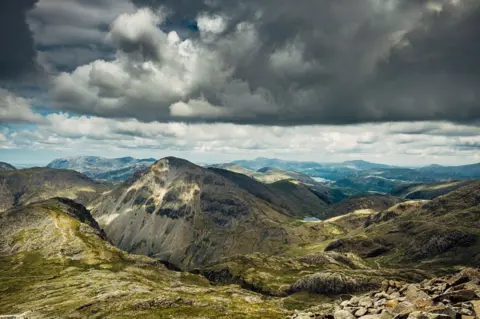 Getty Images
Getty ImagesIt was the space and beauty of the crags and hills that kept her in Cumbria after initially moving from Hertfordshire as a newly qualified social worker more than 40 years ago.
"I sometimes feel it's my natural habitat," she says, while sipping coffee from a Disney-themed mug and stroking the tri-coloured collie slumped on her feet.
"If it wasn't for the rocks, water and sunshine we would not be here, everything depends on those elements.
"That's what we come to these places for, that connection."
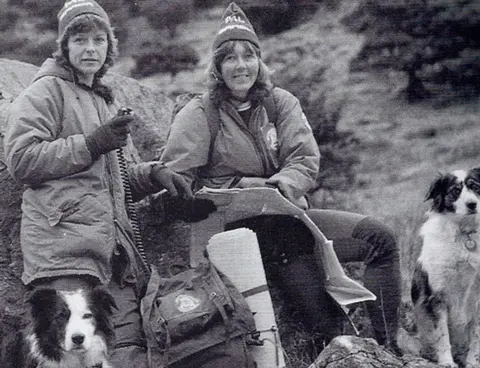 Penny Kirby
Penny KirbyOver the years more and more people have attempted to climb Scafell Pike, many drawn by the spectacular pictures and videos posted on social media.
But there has been a worrying rise in the number of people patently unprepared for the endeavour, Penny says.
Some, for example, use Google Maps to try to navigate their way to the top. Others attempt it in inadequate footwear and without proper equipment, food or water.
"The problem with Google Maps is it makes the top look like a grassy meadow when it is not," Penny says.
"What we really want is for everybody to have a map and compass and know how to use them, but that's not happening."
Other visitors rely on asking other walkers for directions or just following what appear to be paths, but those methods also often lead to call outs to the Wasdale Mountain Rescue team, of which Penny has been a member for 40 years.
"Someone might go one way, get stuck and turn back walking across the same grass, leaving what looks like a path," Penny says.
"To the next person that could look like the way to go and they end up in difficulty."
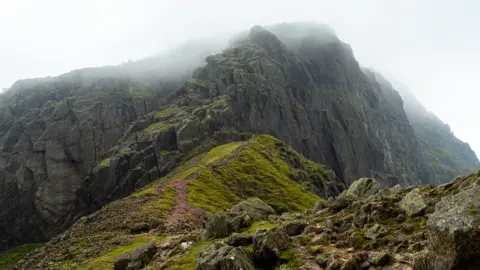 Getty Images
Getty ImagesPenny is one of four leaders of the Wasdale team, which was established in 1968 to aid the stricken in Wasdale and Eskdale.
Some 60% of the team's call outs are to incidents on the mountain, which Penny pronounces like its original spelling Scawfell.
There are two main routes up Scafell Pike.
The one from Borrowdale is longer but a gentler climb, from Wasdale Head it is shorter but very steep.
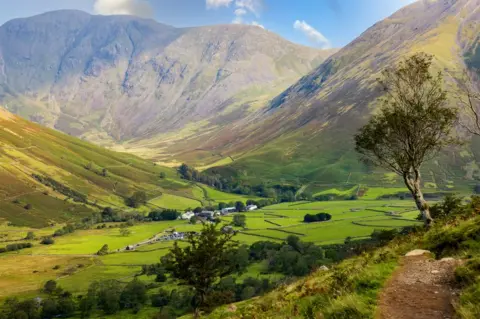 Getty Images
Getty ImagesPenny and her eight-year-old dog Jess know the paths intimately.
Penny started training and working with search dogs soon after joining the team. Jess is her fifth canine helper, trained to detect the odours released into the air by human skin, hair and bacteria.
"On a good day Jess can be worth 20 human searchers," Penny says, with her dog having been involved in 40 missions over the past four years.
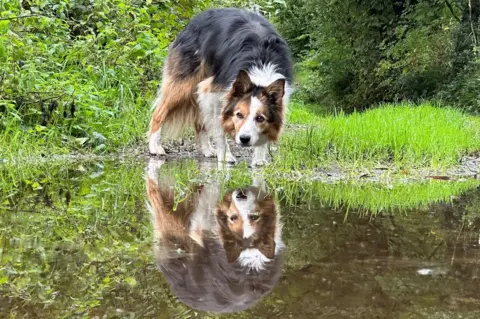 BBC
BBCIt was a chance encounter on the Isle of Skye that led to her volunteering in the first place.
She was in a pub celebrating completing the Skye Ridge with some friends when she got talking to a man who turned out to live two miles away from her in the western Lakes.
He suggested she join up and, a few months after returning home, she was invited to an open event.
She was not the first woman to join the team but they were something of a novelty, with Penny initially presuming her roles would involve making the tea or "manning the radio".
Some of the wives of the male volunteers expressed concerns and suspicions about her doing a bivvy exercise with them on the fells, which Penny laughs about.
"There was nothing romantic about it," she says, recalling the 12-strong group huddling in thin bags against wind and rain on a mountain side.
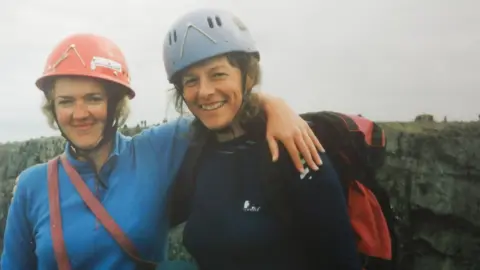 Penny Kirby
Penny KirbyOne of her first practice sessions saw her dangling on a rope from a cliff.
"I think they thought 'we will see what she is made of'," Penny says, adding: "I just felt I would do what I could."
One of her first jobs with her debut dog Ben was to go to Lockerbie in the aftermath of the plane bombing to locate victims.
Her experiences there, which included finding a deceased passenger's clothing in a waterfall, were to have a lasting impact and she would return several times for memorials.
"It knocked me for six," she says when describing meeting relatives of those killed, but she also praises the community for welcoming her and other searchers at such a tragic time.
She was also involved in the search for victims after taxi-driver Derek Bird went on a shooting spree in 2010, killing 12 people and injuring 11.
The Wasdale team recovered the murderer's body after he shot himself in woods, and Penny was among those out early the following morning scouring hedgerows and fields for anyone else caught in his destructive trail.
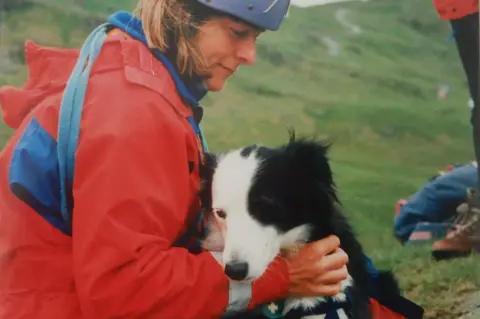 Penny Kirby
Penny KirbyThe majority of the team's calls are to hikers, either missing, injured or lost.
"People tend to go missing in the same places," Penny says, adding many of the call outs are in bad weather or at night.
Sixteen volunteers are needed when somebody has to be stretchered out, a minimum of four are required for a basic search.
The team has been getting busier, responding to 139 incidents in 2022. By mid-September this year they were already at 136.
Some accidents are unavoidable, just a foot placed in the wrong spot or someone (occasionally even a dog) falling ill, but others definitely aren't.
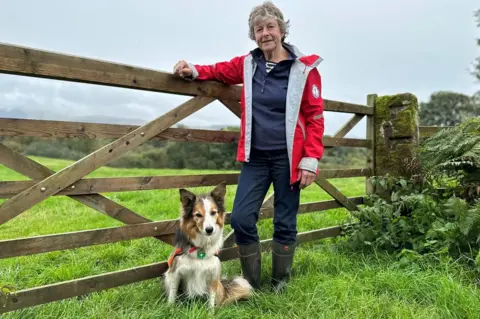 BBC
BBCThere has also been a rise in people swimming in rivers, resulting in more call outs.
Penny cites the case of some people who got into difficulty while using a Youtube video to try and access a swimming spot in Eskdale.
"People post wonderful scenic pictures but don't detail the years of training and experience they have gone through to access these places," Penny says.
"For a lot of people, Scafell Pike is the first mountain they have attempted."
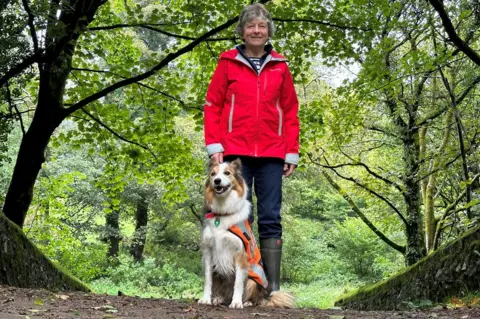 BBC
BBCNo matter the reason behind the call out though, the 50-strong Wasdale team will respond.
"It's a relief when you find someone, both for them and for us.
"While it can be quite normal for us, for them it could have been the worst experience of their life.
"We do not often literally 'save a life', but if we did not go something quite minor could become very serious.
"We just want people to enjoy the mountains while being safe."

Follow BBC North East & Cumbria on X (formerly Twitter), Facebook and Instagram. Send your story ideas to [email protected].
